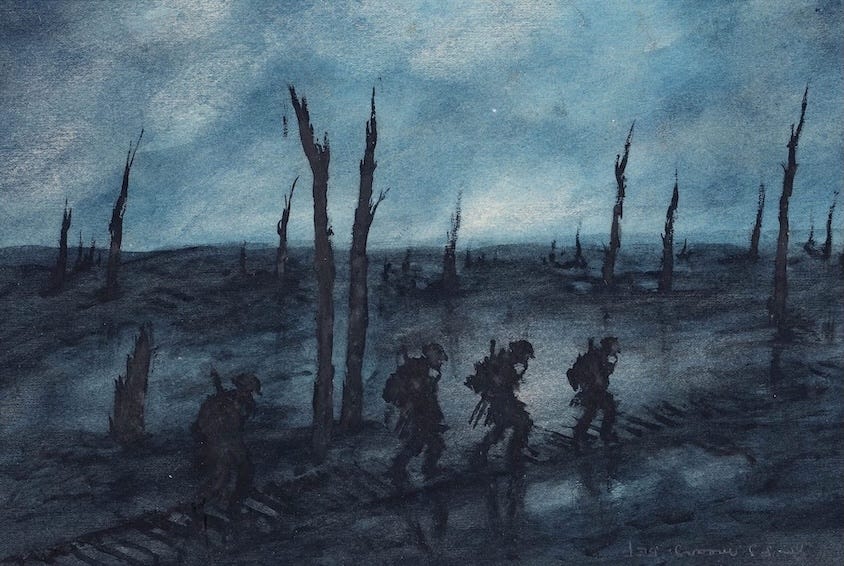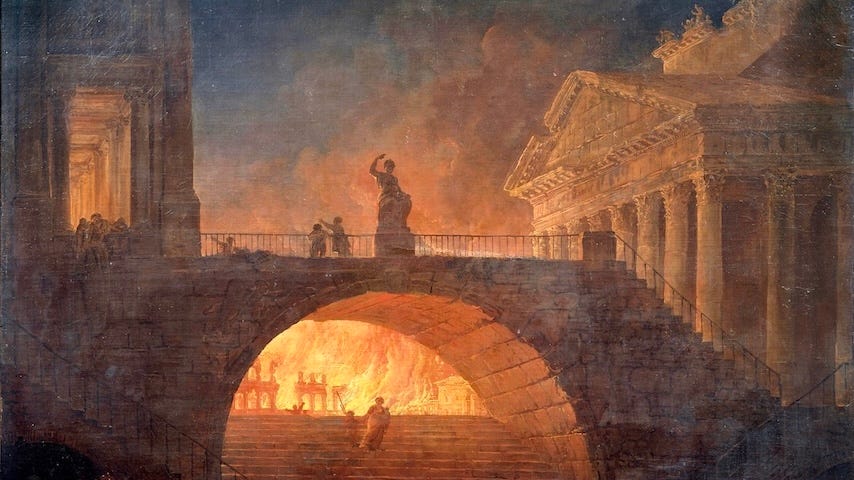Why Culture Still Matters in a Crisis
C.S. Lewis's case for lifelong learning
In October 1939, as Britain entered the Second World War, C.S. Lewis stood before a group of Oxford students and addressed the question everyone was asking:
How could any of them justify studying philosophy or literature while Europe was at war?
The speech he delivered, Learning in Wartime, answers this question at length. And although it was originally delivered to an audience facing the threat of air raids and conscription, it is just as applicable to our world today — a world in which distraction, cynicism, and fear threaten to derail us from the pursuit of culture just as much as any war ever could.
Today, we explore Lewis’s arguments for beauty and learning in the midst of a world that seems to overshadow them both with matters of far greater importance. If you have ever felt the call of the arts or the life of the mind, Lewis’s words will encourage you, regardless of whether or not bombs are falling from the skies.
So here’s why culture and beauty still matter when the world is on the brink of destruction — and the case for lifelong learning in the midst of it all...
Reminder: this is a teaser of our members-only deep dives.
To support our mission and get exclusive content every single week, upgrade for a few dollars per month. You’ll get:
Full-length articles 2x per week
The entire archive of premium articles and podcasts
Membership to our bi-weekly book club (+ subscriber chat room)
Our paid subscriber Great Books Club is currently reading Dostoevsky’s “Notes from Underground”. The next meeting is on Wednesday, November 5, noon ET — join us!
Fiddling While Rome Burns?
Lewis begins by addressing the apparent absurdity of pursuing academic study during wartime. Sensing the students’ fear and preoccupations, he poses the following set of questions:
At first sight this seems to be an odd thing to do during a great war. What is the use of beginning a task which we have so little chance of finishing?
Or, even if we ourselves should happen not to be interrupted by death or military service, why should we -- indeed how can we -- continue to take an interest in these placid occupations when the lives of our friends and the liberties of Europe are in the balance?
Is it not like fiddling while Rome burns?
But what he soon goes on to reveal is that war — or any so-called “unprecedented event” of our day — isn’t actually an aberration of normal human experience. It doesn’t so much disrupt life as it simply reveals what has always been true:
The war creates no absolutely new situation: it simply aggravates the permanent human situation so that we can no longer ignore it. Human life has always been lived on the edge of a precipice. Human culture has always had to exist under the shadow of something infinitely more important than itself.
Lewis then proceeds to point out that there’s no use comparing plagues, wars, or other tragedies to “normal life”, since life has never been a “normal” in the first place. There’s only the allusion of normality, and if you wait for a suitable moment to pursue your craft, it will never arrive:
Even those periods which we think most tranquil, like the nineteenth century, turn out, on closer inspection, to be full of cries, alarms, difficulties, emergencies. Plausible reasons have never been lacking for putting off all merely cultural activities until some imminent danger has been averted or some crying injustice put right.
Yet what makes humanity unique, Lewis states, is that it refuses to wait for suitable moments to pursue culture. In fact, our impulse towards culture is one of the things that distinguishes us from all other animal species. Lewis paints the picture as such:
The insects have chosen a different line: they have sought first the material welfare and security of the hive, and presumably they have their reward. Men are different. They propound mathematical theorems in beleaguered cities, conduct metaphysical arguments in condemned cells, make jokes on scaffold, discuss the last new poem while advancing to the walls of Quebec, and comb their hair at Thermopylae. This is not panache; it is our nature…
But does the fact that this is our nature make it right? Does it make it just? After all, humans have tendencies toward a great many vices…
The True Role of Culture
Lewis anticipates the objection. Just because something is part of our nature doesn’t make it right. Humanity’s appetite for culture and the arts could just as well be an evasion, an elegant way of distracting ourselves from the real work of living well. So he asks the question: is there a rightful place for culture at all?
We have to inquire whether there is really any legitimate place for the activities of the scholar in a world such as this. That is, we have always to answer the question: “How can you be so frivolous and selfish as to think about anything but the war?”
But as he goes on to explain, even something as awful as a world war can never lay claim to the entirety of our focus. This is because, in Lewis’s view, we were created by God with a craving for the eternal and the infinite. It’s not frivolous or selfish to think of things other than the war, because to do otherwise is impossible:
The war will fail to absorb our whole attention because it is a finite object, and therefore intrinsically unfitted to support the whole attention of a human soul.
Reflecting on how he personally came to realize this, Lewis recounts his experience as a soldier in the Great War:
Before I went to the last war I certainly expected that my life in the trenches would, in some mysterious sense, be all war. In fact, I found that the nearer you got to the front line the less everyone spoke and thought of the allied cause and the progress of the campaign; and I am pleased to find that Tolstoy, in the greatest war book ever written, records the same thing…
Just like the man who jokes on the scaffold, Lewis came to realize the importance of culture during those moments in the trenches. Beauty and the intellectual life are not luxuries to be cultivated in the absence of war, they are instead what you need most in the midst of it. “An appetite for these things exists in the human mind,” he writes, “and God makes no appetite in vain.”
But just because you know that it’s okay to pursue culture in the midst of turmoil doesn’t make doing so any easier. In fact, Lewis outlines three grave “enemies” that threaten to derail you, and they’re just as relevant now as they were a century ago.
Fortunately, though, Lewis tells you exactly how to overcome them…
Keep reading with a 7-day free trial
Subscribe to The Culturist to keep reading this post and get 7 days of free access to the full post archives.






